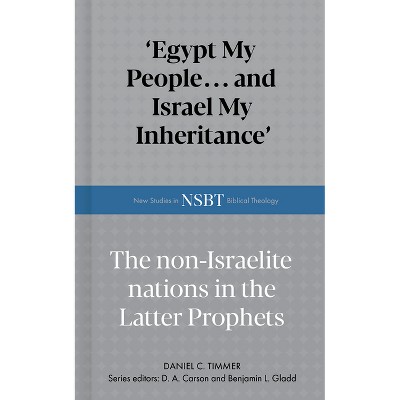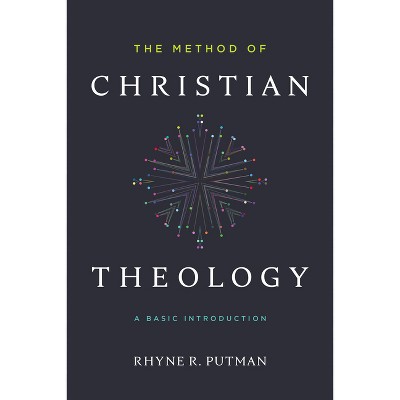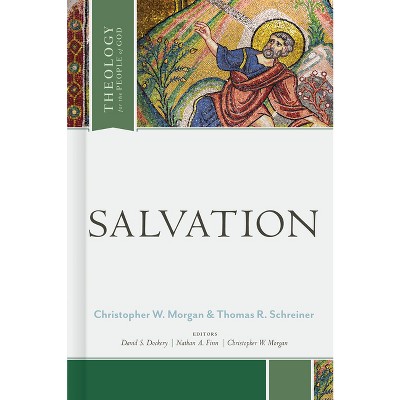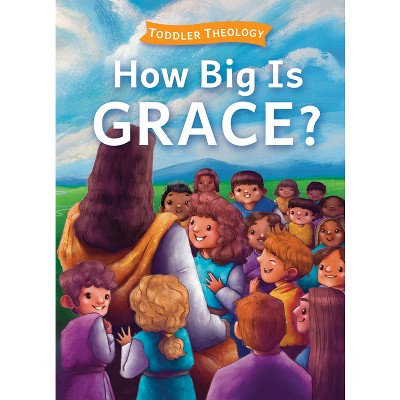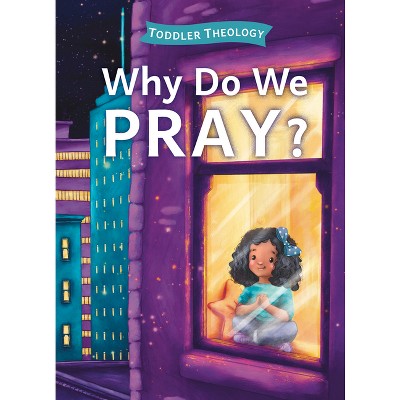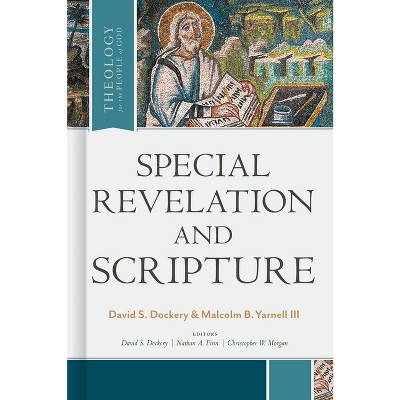Sponsored

Impossible to Be Restored? - (New Studies in Biblical Theology) by Marcus A Mininger (Hardcover)
In Stock
Sponsored
About this item
Highlights
- The letter to the Hebrews contains and engages with some of the most perplexing passages of Scripture.
- About the Author: Marcus A. Mininger is professor of New Testament studies and director of Institutional Assessment at Mid-America Reformed Seminary.
- 200 Pages
- Religion + Beliefs, Biblical Studies
- Series Name: New Studies in Biblical Theology
Description
About the Book
The letter to the Hebrews contains and engages with some of the most perplexing passages of Scripture. Temptation and apostasy provide one way of reading this New Testament book.This volume in the New Studies in Biblical Theology series examines the Letter to the Hebrews, what temptation its audience was facing, and what Hebrews meant when it warned that some who fall away cannot be restored to repentance.
Book Synopsis
The letter to the Hebrews contains and engages with some of the most perplexing passages of Scripture. Temptation and apostasy provide one way of reading this New Testament book.This volume in the New Studies in Biblical Theology series examines the Letter to the Hebrews, what temptation its audience was facing, and what Hebrews meant when it warned that some who fall away cannot be restored to repentance.
Review Quotes
'Marcus Mininger has written a truly new and paradigm changing interpretation of the warning passages in the Book of Hebrews. In particular, his treatment of Hebrews 6:1-6 provides a new and convincing lens through which to understand this difficult passage. His exegesis is careful and comprehensive, and ultimately persuasive. I commend this book to those interested in the topic of apostasy in general and especially the concept of "falling away" from the faith in Hebrews. The conclusions also have pastoral implications.'
--Dr G. K. Beale, Professor of New Testament, Reformed Theological Seminary, Dallas, TX
'Impossible to be Restored? adds further lustre to the already fine series of New Studies in Biblical Theology. Like G. K. Chesterton's Father Brown (who solved crimes by "committing them" himself) Marcus Mininger suggests a solution to some of the puzzles in Hebrews by following the clues that lead us into the sitz im leben of its first hearers. By doing so he provides a coherent interpretation of its warning passages (notably Hebrews 6:4-6). The result is a study that functions at several different levels. To the scholar it offers a careful and stimulating study that serves to loosen an exegetical knot with which theologians have struggled for centuries. To the hard-pressed theological student it gives an (always welcome!) crash course in recent scholarly work on Hebrews. And, not least, to pastors, preachers, and counsellors it provides biblical exposition that will inform their preaching and their ability to give a helpful reading of Scripture not least to troubled souls. All in all, Impossible to be Restored? is a gift to the church.'
--Dr Sinclair B. Ferguson, Chancellor Professor of Systematic Theology, Reformed Theological Seminary
'Marcus Mininger carefully analyses Hebrews' warning about the impossibility of repentance for apostates (Hebrews 6:4). After thoroughly reviewing diverse scholarly opinions, he reformulates a traditional reading of Hebrews' situation. The epistle warns its addressees not to avoid persecution by reverting to Jewish practices, the "foundation" of faith (Hebrews 6:1). Reconciliation to Christ remains possible for serious sinners; retracing the initial path to him through the old covenant is not. A thoughtful exploration of pastoral implications concludes his treatment. Anyone interested in a central theological "crux" of Hebrews will welcome this research.'
--Dr Harold W. Attridge, Sterling Professor of Divinity, Yale University
'I commend this book for setting forth what in my opinion is a definitive advance in understanding the apostasy passages in the book of Hebrews, with special focus on Hebrews 6: -16. It resolves by careful exegesis the difficulties belonging to a most vexing and disputed passage. Moreover, it has practical implications for how theologians think about apostasy and how the church should deal with people who have abandoned the faith or are contemplating it. The book underlines vigorously the fact that Christ is the only way of salvation, thus also providing resources for answering the modern attempts to find an opening for salvation through other religions.'
--Dr Vern S. Poythress, Distinguished Professor of New Testament, Biblical Interpretation, and Systematic Theology, Westminster Theological Seminary
'A person with a fresh perspective poses questions that have ceased to be asked. This fresh inquiry is what Mininger has brought to the study of Hebrews. The questions he poses are fresh, but not na.ve. He has devoted years of scholarly investigation to find suitable answers for some of the most difficult sections of this powerful letter. Insightful, thorough, gracious and pastoral, Impossible to Be Restored? should become a necessary conversation partner for all those interested in the background, text and impact of the Epistle to the Hebrews.'
--Dr Amy Peeler, Kenneth T. Wessner Professor of New Testament, Wheaton College
'Mininger's arguments are impressive. He well argues that the letter is addressed to those primarily influenced by Judaism, to which I agree. Although this is not an unusual conclusion, his argumentation for it, including a fair explanation of those who disagree, is excellent. Beyond this, Mininger's primary burden is to solve many of the difficulties with Hebrews 6:1-6. His solution is that the "impossible to restore again to repentance" text refers to the impossibility to return to the Old Covenant for redemptive-historical reasons. This conclusion needs to be considered seriously by the scholarly world, and more especially, the evangelical world. Although in the end, I disagree with Mininger on this, I am wholeheartedly in favour of this view being included as one of the standard views on Hebrews 6.'
--Dr Robert J. Cara, Hugh and Sallie Reaves Professor of New Testament, Reformed Theological Seminary, Charlotte, NC
'Nothing in Hebrews has proven to be more perplexing, for some even confounding, nothing has resulted in a more wide-ranging and complex spectrum of views than the meaning of those passages that warn against the temptation to apostasy, especially in chapters 6 and 10. This volume makes an important and welcome contribution to this complicated debate. Future treatments of these passages are bound to benefit from considering the thesis - based on thorough research, carefully and clearly argued - that Mininger advances. Beneficial too are the valuable insights he provides into the theology of Hebrews as a whole.'
--Dr Richard B. Gaffin, Jr., Professor of Biblical and Systematic Theology, Emeritus, Westminster Theological Seminary
'Here is a carefully argued and clearly articulated approach to solving some of the stickier interpretative issues in Hebrews. Mininger offers fresh insights into Hebrews in light of its place in redemptive history, and helps us consider how this letter continues to speak to us today.'
--Dr Brandon Crowe, Professor of New Testament, Westminster Theological Seminary
'Marcus Mininger has helpfully reconsidered the problem addressed in Hebrews and the author's way of dealing with it. He offers a careful critique of both traditional and revisionist positions, asking whether the audience of Hebrews was tempted to return to the old covenant rather than to "Judaism" as such. Eight traditional views of the warning passages are critiqued and Mininger proposes that a radical "situational change" from a new covenant position is what makes it impossible for some people to be restored to repentance. This book provides excellent resources for advancing our understanding of this critical issue.'
--Dr David Peterson, Emeritus faculty member at Moore Theological College, Sydney
'In this thorough study of Hebrews' warning against apostasy, Marcus Mininger effectively exposes the shortcomings of existing interpretive approaches before offering a fresh and convincing reading that has been hiding in plain sight. His redemptive-historical interpretation, focusing on the impossibility of returning from the new covenant to the old covenant alone, aligns seamlessly with both the letter's theological argument and the broader biblical witness. Through careful exegesis and theological insight, Mininger not only illuminates this challenging text but also deepens our understanding of how Hebrews views the relationship between the covenants. Importantly, his objective covenantal reading helps relieve the subjective anxieties this passage often causes, showing that it warns not against an "unforgivable sin" that prevents a return to Christ, but against attempting to find refuge in the old covenant after having entered the new. This is biblical-theological scholarship at its finest--historically informed, exegetically rigorous, and theologically astute.'
--Dr Camden Bucey, Executive Director and Fellow, Reformed Forum
About the Author
Marcus A. Mininger is professor of New Testament studies and director of Institutional Assessment at Mid-America Reformed Seminary. He serves as associate pastor at New Covenant Community Church (OPC), and on the Candidates and Credentials Committee of the OPC's Presbytery of the Midwest. He is coeditor of the Mid-America Journal of Theology, a member of the Evangelical Theological Society and the Society of Biblical Literature, and preaches and teaches at Reformed churches around the USA.Shipping details
Return details
Frequently bought together
Trending Non-Fiction












